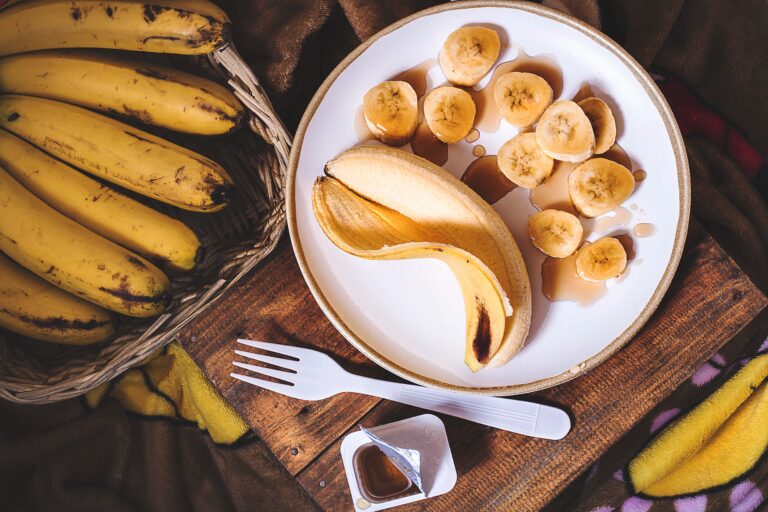Sara Dow is a ACE Certified Weight Management and Fitness Nutrition Specialist. She is also a ACE Certified Personal Trainer and Small Group Trainer at the Y. Twice a month, her blog posts will feature nutrition education, a healthy recipe she has tried and loves, and tips to help you achieve your health goals, as well as answers centered around a nutrition question from a Y member.

As a fitness nutrition specialist and personal trainer at the YMCA, people often ask me about the best foods to support overall health and athletic performance. One question that’s been trending is: are green bananas better than ripe ones? Some people even wonder if they should eat bananas at all. In this post, we’ll dive into the benefits of both green and ripe bananas and dispel some myths along the way.
Green Bananas: Prebiotic Powerhouses
First, let’s talk about why green bananas are so popular. Green bananas are unripe bananas that contain resistant starch. Resistant starch is a type of carbohydrate that resists digestion in the small intestine and acts like fiber in the large intestine. Foods containing resistant starch help regulate blood sugar levels, support healthy digestion, and promote feelings of fullness. However, some people find green bananas harder to digest and may cause bloating or other digestive discomfort.
While green bananas are a great source of resistant starch, many other foods offer similar benefits. Some examples include cooked and cooled potatoes, beans, lentils, green peas, and cashews. All these foods contain resistant starch, fiber, and other nutrients which support healthy digestion and blood sugar control.
Ripe Bananas: Sweet and Nutritious
So, what about ripe bananas? Are they bad for you compared to their green counterparts? Absolutely not! Ripe bananas are packed with essential vitamins and minerals like potassium, which regulates fluid balance, vitamin C, which supports your immune system; and vitamin B6, which is vital for brain function and hormone production. Ripe bananas are also easier to digest than green bananas and provide quick energy for physical activities.
Bananas: The Sweet Truth
While bananas sometimes get a bad rap for being high in sugar, the natural sugar found in bananas comes packaged with fiber, which helps slow down its absorption into the bloodstream. If you’re concerned about the impact of bananas on your blood sugar levels, try pairing them with a high-protein or high-fiber food.
For instance, you could enjoy a banana with a handful of almonds or a slice of whole-grain toast with almond butter. Not only will this help slow down the absorption of sugar, but it’ll also give you an extra boost of protein and fiber to help keep you full and satisfied.
Bananas: Breakfast and Snack Ideas
- Breakfast: Top oatmeal or yogurt with banana slices or spread whole wheat toast with nut butter and banana slices for a boost of energy to jump-start your day.
- Pre-workout snack: Eat a ripe banana with a tablespoon of almond butter or a small handful of almonds 30-60 minutes before your workout. The natural sugar in the banana will provide a quick boost of energy, while the healthy fats and protein in the almonds offer sustained energy and support post-workout recovery.
- Post-workout snack: Blend a ripe banana with Greek yogurt, chocolate milk, and frozen berries. This will provide an outstanding balance of carbs, protein, and antioxidants to support muscle recovery and reduce inflammation post-workout.
Performance Nutrition Workshop
If you want to learn more about how to fuel your workouts, register for my performance nutrition workshop. You’ll receive evidence-based guidelines for pre- and post-workout nutrition, recipes, and practical tips for incorporating real foods into your diet to support optimal performance and recovery.
About Sara Dow

Hi, I’m Sara and I am passionate about helping people improve their quality of life through the knowledge and practice of good nutrition.
In 2018, I was inspired by the YMCA community to go back to school and pursue my dream of becoming a registered dietitian. I am now in my senior year, double majoring in Nutrition and Dietetics at Kansas State University. I am excited to share with you what I am learning.
![[Glacial Community YMCA LOGO SQ]](https://recliquecore.s3.amazonaws.com/imgs/ymca_logos/named_y/blue_purple.png)
![[Glacial Community YMCA LOGO FULL]](https://s3.amazonaws.com/recliquecore/imgs/ymca_logos/named/blue_purple.png)




